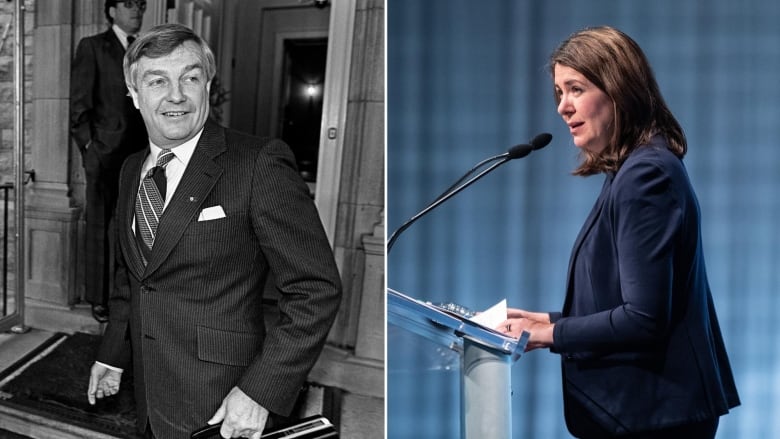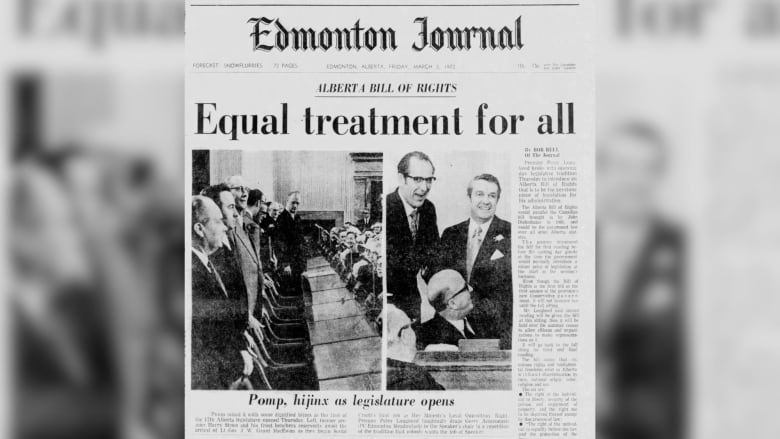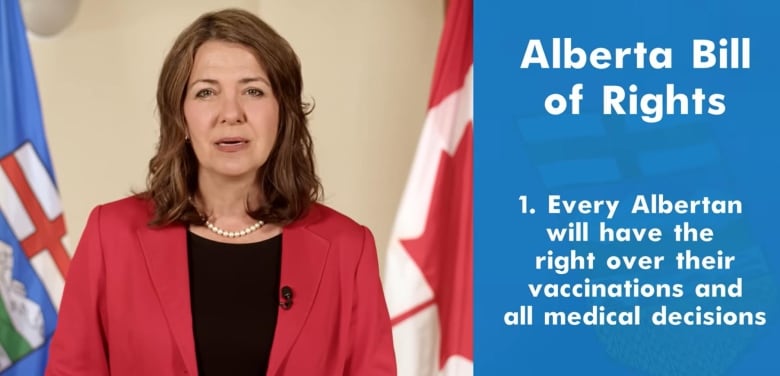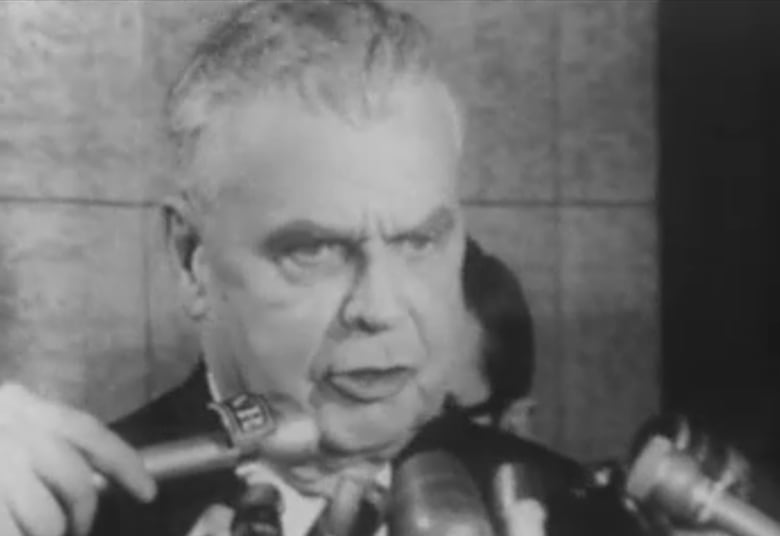Here's what's in Alberta's Bill of Rights and what Danielle Smith is set to change
UCP seeks to affirm rights regarding guns, property and vaccines

When the 17th Alberta Legislature opened on March 2, 1972, then-premier Peter Lougheed moved quickly to introduce what the Edmonton Journal described as "the keystone piece of legislation for his administration."
Lougheed said the primary effect of the legislation the Alberta Bill of Rights was to "shield the citizen from government abuse of its power," the Calgary Herald reported in an article the same day.
Decades later, it's legislation that's now set to see some notable changes, some of which observers say could lead to jurisdictional challenges.
In a video posted online last week, Alberta Premier Danielle Smith said the Alberta Bill of Rights has served its purpose well over the years.
"But as our society evolves, so too must our laws to ensure our rights and freedoms remain properly protected in an ever-changing world," Smith said.

At its inception, the Alberta Bill of Rights laid out six human rights and fundamental freedoms that it stated existed in Alberta without discrimination by race, national origin, colour, religion and sex:
- The right of the individual to liberty, security of the person and enjoyment of property, and the right not to be deprived thereof except by due process of law.
- The right of the individual to equality before the law and the protection of the law.
- Freedom of religion.
- Freedom of speech.
- Freedom of assembly and association.
- Freedom of the press.
The Bill of Rights has been amended in recent years, including some minor tinkering.
One major amendment was expanding the reference to sex to includesexual orientation, gender identity and gender expression. The other major change was adding aseventh right the right of parents to make informed decisions respecting the education of their children. Both amendments came into effect in June 2015, having been passed by the Progressive Conservative government of the day earlier that year.
What's set to change
In her video, Smith said the provincial government would introduce legislationin a few weeks to amend the Alberta Bill of Rights.
Smith proposed adding the following:
- The right to make one's own choices over vaccinations and all medical decisions.
- The right to not be deprived of one's property without due legal process and just compensation.
- The right to legally acquire, keep and safely use firearms.

Those three rights were mentioned in a draft revision endorsed by the United Conservative Party's board. That draft featured elements included in the original Lougheed-era document, others from last year's public health emergencies review panel helmed by retired politician Preston Manning, and still others proposed by the group that calls itself the Black Hat Gang.
That group proposed many other rights, like the right to "life, liberty and the pursuit of happiness," and the right to use force to defend one's property. It's not clear if any other proposed rights might be included in an updated Alberta Bill of Rights.
A spokesperson in the premier's office said the three that Smith promises represented the "key amendments" being proposed and noted the legislation will be tabled and made publicly available when the legislative assembly returns.
The Alberta Legislature is back in session in late October, shortly before Smith faces a party leadership review in early November.
The role of the Alberta Bill of Rights
The Alberta Bill of Rights applies only in Alberta. It only concerns the Alberta Legislature, and it has no impact on the Canadian Parliament or the laws it will enact.
But it does lay out what the Alberta government says the Alberta Legislature must not infringe on, said Eric Adams, a constitutional law professor at the University of Alberta.
"To the extent that those rights and freedoms are commonly shared rights and freedoms in which there is broad public consensus I think that the Alberta Bill of Rights plays an important function, both symbolically and legally," he said.

There is no formal written constitution in Alberta. But in Adams's view, the Alberta Bill of Rights is already a part of the province's unwritten constitution in essence, the set of parliamentary traditions and statutes that make up a framework for governing.
That said, given it only serves as a single law, the Alberta Bill of Rights can't completely strike down other laws and, when faced with an obvious conflict, judges must find a way to make both laws work together, if possible, Adams said.
If that's not possible, judges may decide to render the offending part of another law "inoperative" meaning, effectively, to not apply something Adams noted has happened in Alberta's past.
"[The Alberta Bill of Rights is] not the most powerful jaws in our constitutional arsenal, but there's teeth there. It's not just symbolic. A court faced with a constitutional challenge under the Bill of Rights has to take the rights there seriously," Adams said.
Smith said last Wednesday she's open to the idea of adopting a formal constitution, but in the meantime, the Alberta Bill of Rights is intended to serve as an overarching statement of the values held by the province.
"In practice, what has happened is that the courts don't give deference to certain things if they're not enumerated on a piece of paper. And so what we are doing is we're just affirming what we believe are historic rights," Smith told reporters last Wednesday.
Historically, the Alberta Bill of Rights has focused on protecting matters that tend to hold reasonable political consensus, no matter where one falls on the political spectrum, Adams said.
But its standing might be drawn into question if rights are added that tend to represent more particular political views, in the professor's opinion.
"People disagree about [guns and vaccines]. If you take those topics, you turn them into rights, and you say, 'Everybody agrees in Alberta, these are fundamental to the province,' then I think you're making an ideological statement," he said, adding future Alberta governments could see the bill as a tool for partisan agendas.
"That opens up the Alberta Bill of Rights to debate about whether, in fact, that is part of Alberta's proper constitutional culture."
Guns are a federal jurisdiction
Where observers say this could start to get thornier isthe division of powers between the federal and provincial governments, especially given the new rights proposed by Smith.
As mentioned, the Alberta Bill of Rights binds the Alberta Legislature, not the Canadian Parliament.
"It's pretty clear that the Alberta Bill of Rights will not be able to have any impact on whether or not the federal Parliament outlaws the ownership of particular kinds of weapons, or passes laws that restrict their ownership in various ways," Adams said.
"I think some people are going to be surprised by that. Because it sounds like a right to own a gun means you've got that right and no one can stop you. Well, the Alberta Bill of Rights simply doesn't have the authority or the jurisdiction to say anything about the way that the federal Parliament can lawfully restrict firearms use."
Parliament has jurisdiction over criminal law, which has been backed up by the Supreme Court of Canada.
"The Alberta Bill of Rights may say you've got a right to own a gun, but the Parliament of Canada's law is going to trump those rights every time," Adams said.

Blair Hagen, executive vice-president of Canada's National Firearms Association (NFA), said the group views adding rights around firearms to the Alberta Bill of Rights as a "very positive step."
He said the group is advising its members and firearms owners in Alberta to attend the UCP's 2024 annual general meeting and support the motion to update the Bill of Rights.
"I think it needs a very, very public, and a very strong show of support at the convention," he said.
He acknowledged the federal government does have jurisdiction over gunsbut noted the NFA believes this represents an important "symbolic step" pushing back against future gun restrictions.
"It also sets the stage for co-operation between provinces and future federal governments towards protecting those rights," he said.
Chinenye Anokwuru, a spokesperson for the provincial minister of justice, said the proposed firearms amendment would represent "Alberta's government [signalling] to the federal government that we take lawful firearm ownership seriously."
Vaccinations and medical procedures
When it comes to making one's choices in regards to medical treatments, Smith said that includes "ensuring that every individual in our province who has the mental capacity to do so will have the right to decide whether or not to receive a vaccination or other medical procedure."
"In recent years, we've seen the challenges and hardship that can arise when that right to bodily autonomy is not adequately protected," Smith said.
"It is my firm conviction that no Albertan should ever be subjected or pressured into accepting a medical treatment without their full consent."

Smith was asked by a reporter last Wednesday if she had specific examples of instances in which bodily autonomy was not respected in Alberta.
"During the COVID-19 pandemic, when government workers were fired from their jobs for not having vaccination, and we've now had two judgments against us. It was grieved by the nurses' union and grieved by the Alberta Union of Provincial Employees, and we lost," Smith said.
CBC News asked for instances in which government workers were fired from their jobs for not getting a vaccination. A spokesperson in the premier's office said there were more than 1,400 Alberta Health Services employees placed on unpaid leave because of their vaccination status during the COVID-19 pandemic.
"Various unions grieved the decisions and an arbitrator with the Alberta Labour Relations Board awarded compensation to 288 AUPE employees. Other unions have also filed grievances on the policy," reads a statement attributed to spokesperson Savannah Johannsen.
A spokesperson with the AUPE declined to comment. The United Nurses of Alberta said it arbitrated four terminations at the end of August from the Good Samaritan Society for non-compliance of the immunization requirement and was awaiting a decision.
Unlike guns, which is a matter of federal responsibility, the opposite could be the case for vaccinations. Health-care delivery falls under provincial jurisdiction.
The final wording around this update will be something to watch, said Adams.
"There's been a long-standing practice of requiring vaccinations for doctors, nurses, dentists, health-care workers to prevent communicable diseases that might otherwise transmit to patients that are vulnerable during a medical procedure," Adams said.
"Are we really saying in Alberta we're not going to require doctors or nurses to receive safe vaccinations that might prevent the spread of measles or hepatitis or influenza?"
Anokwuru said rights guaranteed by the Alberta Bill of Rights, including the proposed amendment around vaccinations, apply only to government and government entities, and not private employers.
Property rights
Smith also provided more information around the property rights portion of the update.
She noted that property rights have been mentioned in the 1960 Canadian Bill of Rights, advanced by the federal government of John Diefenbaker, and the Alberta Bill of Rights in its initial form.
"But it's always been missing a piece. It's been a missing of affirmation of just compensation, because if private property is taken for public use, then the government, on behalf of the public, should pay for it," Smith said.
"Just compensation is going to be built into that, in the event that property is taken entirely through an expropriation proceeding, or the effective use of it is taken away."

Adams said Alberta law has long insisted on compensation for expropriation of property, under the Expropriation Act.
"These are policy positions at the Alberta Legislature under this government already. It's not clear if that will have that much impact on this particular government. But we will wait and see if these aspects of the Alberta Bill of Rights have a lasting impact on the legal landscape in Alberta," he said.
Asked about the possible overlap with the Expropriation Act, Anokwuru said the amendments will ensure that "no Albertan can be deprived of their property without legal authorization and just compensation."
"This is a reaffirmation of your right to own and enjoy the property you have worked so hard to earn," Anokwuru wrote in a statement. "Further details will be available upon introduction of the legislation."












_(720p).jpg)


 OFFICIAL HD MUSIC VIDEO.jpg)
.jpg)



























































































